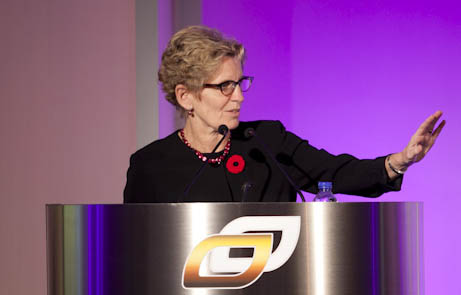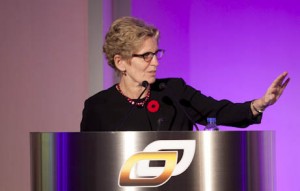Local MPPs, OUSA respond to Ontario budget


With the Ontario budget tabled and set to be scrutinized, its attempts to address student concerns will come under serious consideration by constituents and political opponents over the coming weeks.
This year’s budget contains a number of measures directed toward youth and students, including a $295 million fund to continue the employment and the maintenance of the 30 per cent tuition grant.
“Our goal is always to make sure that no qualified student is ever denied access because of financial reasons,” said John Milloy, Liberal MPP for the Kitchener Centre riding.
The Youth Jobs Strategy aims at promoting youth employment, with a particular focus on entrepreneurship and innovation.
Ontario Undergraduate Student Alliance (OUSA) executive director Rylan Kinnon expressed approval for the strategy, but identified that they “hope to engage [the government] in a conversation about how we think they should spend that money.”
Kinnon identified better opportunities for in-study employment and creation of more co-op positions as potential areas for improvement. However, issues of affordability and accessibility still remain a concern for government critics.
“Well, I think when you look at the overall budget … there were no new initiatives to make universities and colleges more affordable for students,” said Catherine Fife, MPP for Kitchener-Waterloo. “For some reason this government feels it’s okay to allow tuition to rise.”
“Ontario universities still operate with the least funding per student in the country and obviously we would like to be at a place where Ontario is more closely matching the per student funding levels we see elsewhere in the country,” said Kinnon.
As part of this year’s tuition framework, tuition in Ontario will continue to rise at three per cent annually for most arts and science undergraduate students, compared to its previous five per cent climb. Along with increased financing for education, the budget also set aside millions for social spending programs. Both opposition parties have expressed concerns about spending increases in light of Ontario’s current $9.8 billion budget deficit, which the Liberals aim to eliminate by 2017-2018.
“We were surprised and concerned that some of the spending projections were as high as they were, when our plans were costed out in a very practical way,” acknowledged Fife.
Tracey Weiler, the PC candidate for Kitchener-Waterloo in the last by-election, also expressed dissatisfaction with the government’s spending choices.
“With that spending increase, that’s obviously going to increase our deficit … and that’s something that’s really concerning,” she said. “That means that we have less money for our priority things like health and education.”
She continued, “They [constituents] do feel Ontario is not on the right track.”
When asked whether the budget was financially feasible, Milloy countered by saying, “very much so.”
“We’re going to see government having to target its resources on what’s truly the most important and putting some other things either on hold or having some reductions,” he said. “We’re on track to eliminate the deficit, but at the same time, we recognize we need to make these investments.”
With a non-confidence motion put forth earlier in the week by the PCs, power largely resides with the NDP in determining whether the budget will pass and the government will stand. However, provincial PC leader Hudak’s open intention to reject the budget – in advance of seeing it – has not resonated well with the other parties.
“The legislature should be a forum for some give and take to come forward with some solutions,” expressed Milloy. “And when we have one party, the Official Opposition, which is totally checked out, I think there’s something anti-democratic about that.”
Fife added, “The Conservatives have abdicated their responsibility to try and make a minority government work,” acknowledging that minority government is likely to be a provincial reality in years to come, regardless of the governing party.
While many NDP budget demands were met, the party is taking time to consult with its constituents before offering its final judgement.
“At first glance, this budget looks like it met all of our requests. However, there are some serious accountability measures that are missing,” said Fife. “We take the responsibility of reviewing the budget very seriously.”
A vote on the budget motion will likely occur within the coming weeks.

